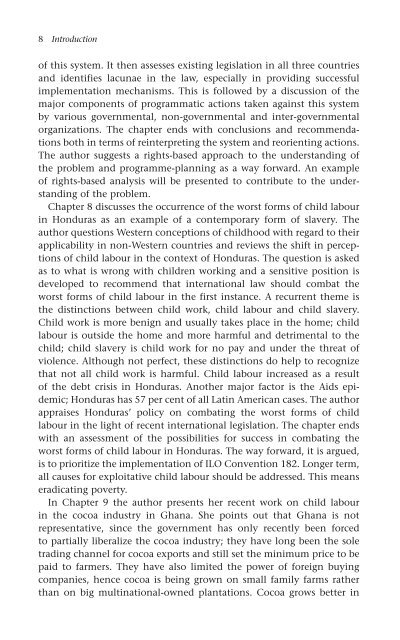3071-The political economy of new slavery
3071-The political economy of new slavery
3071-The political economy of new slavery
Create successful ePaper yourself
Turn your PDF publications into a flip-book with our unique Google optimized e-Paper software.
8 Introduction<br />
<strong>of</strong> this system. It then assesses existing legislation in all three countries<br />
and identifies lacunae in the law, especially in providing successful<br />
implementation mechanisms. This is followed by a discussion <strong>of</strong> the<br />
major components <strong>of</strong> programmatic actions taken against this system<br />
by various governmental, non-governmental and inter-governmental<br />
organizations. <strong>The</strong> chapter ends with conclusions and recommendations<br />
both in terms <strong>of</strong> reinterpreting the system and reorienting actions.<br />
<strong>The</strong> author suggests a rights-based approach to the understanding <strong>of</strong><br />
the problem and programme-planning as a way forward. An example<br />
<strong>of</strong> rights-based analysis will be presented to contribute to the understanding<br />
<strong>of</strong> the problem.<br />
Chapter 8 discusses the occurrence <strong>of</strong> the worst forms <strong>of</strong> child labour<br />
in Honduras as an example <strong>of</strong> a contemporary form <strong>of</strong> <strong>slavery</strong>. <strong>The</strong><br />
author questions Western conceptions <strong>of</strong> childhood with regard to their<br />
applicability in non-Western countries and reviews the shift in perceptions<br />
<strong>of</strong> child labour in the context <strong>of</strong> Honduras. <strong>The</strong> question is asked<br />
as to what is wrong with children working and a sensitive position is<br />
developed to recommend that international law should combat the<br />
worst forms <strong>of</strong> child labour in the first instance. A recurrent theme is<br />
the distinctions between child work, child labour and child <strong>slavery</strong>.<br />
Child work is more benign and usually takes place in the home; child<br />
labour is outside the home and more harmful and detrimental to the<br />
child; child <strong>slavery</strong> is child work for no pay and under the threat <strong>of</strong><br />
violence. Although not perfect, these distinctions do help to recognize<br />
that not all child work is harmful. Child labour increased as a result<br />
<strong>of</strong> the debt crisis in Honduras. Another major factor is the Aids epidemic;<br />
Honduras has 57 per cent <strong>of</strong> all Latin American cases. <strong>The</strong> author<br />
appraises Honduras’ policy on combating the worst forms <strong>of</strong> child<br />
labour in the light <strong>of</strong> recent international legislation. <strong>The</strong> chapter ends<br />
with an assessment <strong>of</strong> the possibilities for success in combating the<br />
worst forms <strong>of</strong> child labour in Honduras. <strong>The</strong> way forward, it is argued,<br />
is to prioritize the implementation <strong>of</strong> ILO Convention 182. Longer term,<br />
all causes for exploitative child labour should be addressed. This means<br />
eradicating poverty.<br />
In Chapter 9 the author presents her recent work on child labour<br />
in the cocoa industry in Ghana. She points out that Ghana is not<br />
representative, since the government has only recently been forced<br />
to partially liberalize the cocoa industry; they have long been the sole<br />
trading channel for cocoa exports and still set the minimum price to be<br />
paid to farmers. <strong>The</strong>y have also limited the power <strong>of</strong> foreign buying<br />
companies, hence cocoa is being grown on small family farms rather<br />
than on big multinational-owned plantations. Cocoa grows better in


